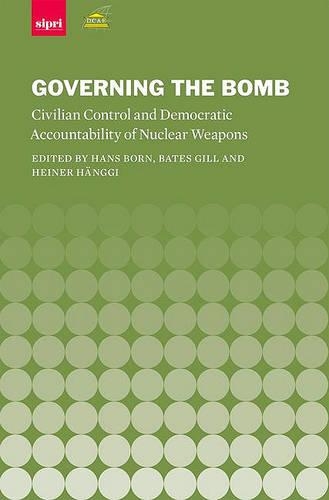
Governing the Bomb: Civilian Control and Democratic Accountability of Nuclear Weapons
Series: Sipri Monograph
'Go nuclear' or 'go zero'--as the international community stands at a nuclear crossroads, a number of questions demand urgent attention: How do established and emerging nuclear-armed states manage their nuclear affairs? Who commands and controls a country's nuclear forces? What effect does the balance between secrecy and openness have on larger questions of security and democracy? Governing Nuclea
NaN
VOLUME
English
Hardback

'Go nuclear' or 'go zero'--as the international community stands at a nuclear crossroads, a number of questions demand urgent attention: How do established and emerging nuclear-armed states manage their nuclear affairs? Who commands and controls a country's nuclear forces? What effect does the balance between secrecy and openness have on larger questions of security and democracy? Governing Nuclear Weapons is grounded in the belief that the public's ability to hold nuclear-armed states accountable for the security of their weapons is contingent on proper knowledge of domestic nuclear governance. With a special emphasis on civilian control and democratic accountability, it seeks to illuminate the structures and processes of nuclear weapons governance of eight nuclear-armed states: China, France, Russia, the UK, and the US, as well as India, Israel, and Pakistan. It examines the theoretical as well as practical functions and structures of those who possess the power to make nuclear decisions and those who have the practical means and physical opportunity to execute those decisions. While the book assesses the whole spectrum of political oversight and control mechanisms in operation for each country--including the roles and requirements of the executive, the military and specialized civilian institutions--it also takes a closer look at parliamentary institutions and civil society at large. As nuclear terrorism, proliferation and disarmament vie for the top slot on the global security agenda, a comparative understanding of the various national nuclear discourses is no longer optional, but required.About the Author: Hans Born heads the Democratic Control of Armed Forces's Parliamentary and Legal Programs. He is also an Executive Board Member of the European Research Group of Military and Society and in this capacity he coordinates research in civil-military relations in Europe. Additionally, he is guest lecturer at the Swiss Federal Institute for Technology in Zurich and at the United Nations Fellowship Programme in Geneva. He is a Faculty Member of the ETH Zurich Master of Advanced Studies on Security Policy and Crisis Management. Bates Gill is Director of the Stockholm International Peace Research Institute. Prior to being named the SIPRI director in 2007, Gill held the Freeman Chair in China Studies at the Center for Strategic and International Studies in Washington, DC, from 2002. He has previously held positions at the Brookings Institution, where he was the inaugural Director of the Center for Northeast Asian Policy Studies, and at the Center for Nonproliferation Studies of the Monterey Institute of International Studies. He is a member of the Council on Foreign Relations and the International Institute for Strategic Studies, and has consulted for a number of multinational corporations and government agencies. Heiner Hänggi is Assistant Director and Head of Research at the Geneva Centre for the Democratic Control of Armed Forces. He is also an Associate Professor of Political Science at the University of St. Gallen in Switzerland, and an Associate Fellow at the Geneva Centre for Security Policy. His recent research and publications focus on the concepts of security sector reform and security governance in post-conflict peacebuilding. Most recently, he has been working with the UN and member states on the development of a UN policy for security sector reform. He is also assisting the Inter-parliamentary Forum on Security Sector Governance (IPF-SSG) in Southeast Asia and the Thai Study Group on Good Governance of the Security Sector.
Price Comparison [India]
In This Series
Bestseller Manga
Trending NEWS




















